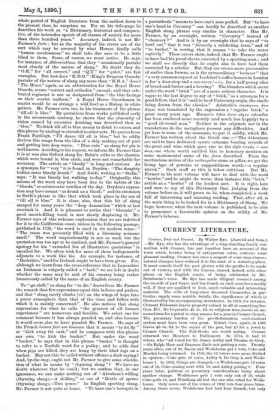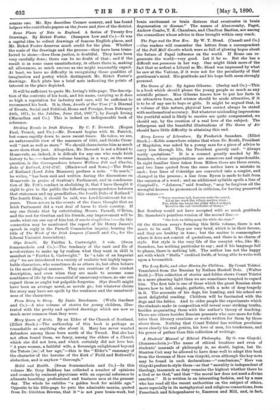CURRENT LITERATURE.
Cromer, Past and Present. By Walter Rye. (Jarrold and Sons.) —Mr. Rye, who has the advantage of a long-standing family con- nection with Cromer, has put together here an account of the town which, besides being of antiquarian value, contains some pleasant reading. Cromer was once a seaport of some importance ; natural changes have reduced it to the rank of a watering-place. It must console itself for past glories with the profits to be made out of visitors, and with the honour, shared, indeed, with other places on the English coasts, of being celebrated in Mr. Swinburne's verse. Mr. Rye has made diligent research among the records of past times, and has found, as such searchers mostly will, if they are qualified to look, much valuable and interesting material. The wills of long-since deceased Cromeritos, in par- ticular, supply some notable details, the significance of which is illustrated by the accompanying inventories. In 1519, for instance, Clement Fisheman leaves property valued in all at something less than .R15. He bequeaths £1 4s. 4d. to religious uses, besides an un- named sum for a priest to sing masses for a year in Cromer Church. The pecuniary burden of the pre-Reformation ecclesiastical system must have been very great. Robert Carr, again, in 1583 leaves £3 6s. 8d. to the repair of the pier, but ..e5 for a jewel to Cromer Church. The Poll-Books are worth noting. Cromer returned two Members to Parliament. In 1714, it had 16 voters, who "all voted for Sir James Astley and Thomas de Grey, —Sir Ralph Hare and Erasmus Earle not getting a vote. Twenty years after, out of 30, Bacon and Wodehouse get 1 vote, Coke and Morden being returned. In 1768, the 12 voters were more divided in opinion.—Coke gets 10 votes, Astley 9, De Grey 4, and Wode- house 1. In 1802, things are changed,—a Wodehouse gets 13 votes out of 19, Coke coming next with 10, and Astley polling 6. Four years later, political or pecuniary considerations bring about another change. Wodehouse gets 1 vote only out of 19, while Coke polls 16, and Windham all but the one who voted for Wode- house. Only seven out of the voters of 1802 vote four years later. Among these seven, Wodehouse had had four friends, but only
retains one. Mr. Rye describes Cromer scenery, and has found helpers who contribute papers on the fauna and flora of the district.







































 Previous page
Previous page